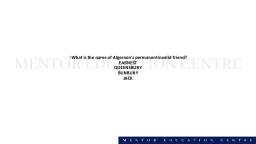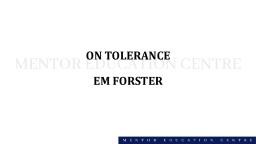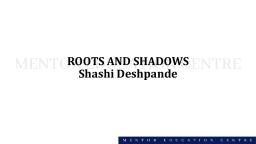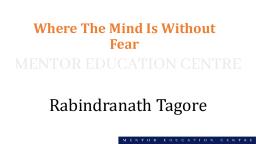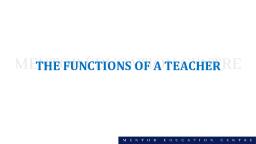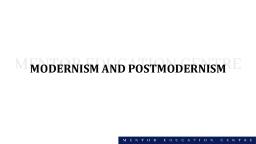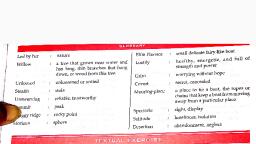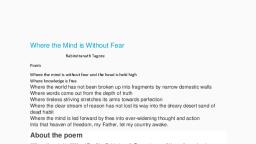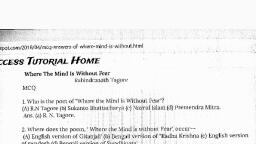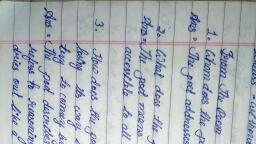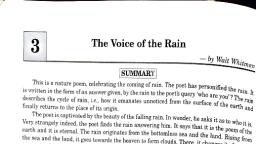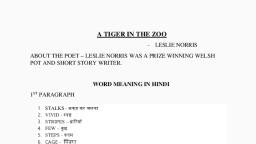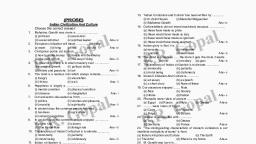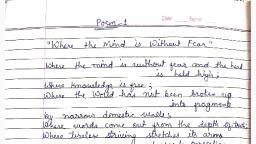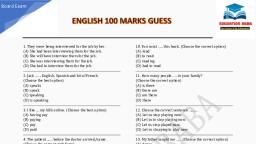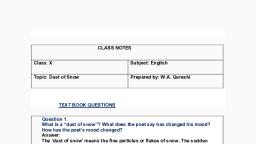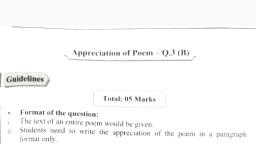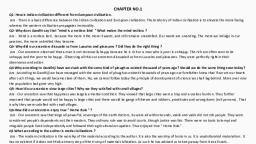Page 2 :
1. Who is the poet of "Where the Mind, is Without Fear'?, (A) R.N Tagore (b) Sukanto, Bhattacharya (c) Nazrul Islam (d), Premendra Mitra., Ans. (a) R. N. Tagore.
Page 3 :
2. Where does the poem, ‘ Where the, Mind is without Fear’, occur—, (A) English version of Gitanjali’ (b), Bengali version of “Radha Krishna (c), English version of swadesh (d) Bengali, version of Swadhinata’.
Page 4 :
2. Where does the poem, ‘ Where the, Mind is without Fear’, occur—, (A) English version of Gitanjali’ (b), Bengali version of “Radha Krishna (c), English version of swadesh (d) Bengali, version of Swadhinata’., Ans. (a) English version of Gitanjali
Page 5 :
3. The expression, “Knowledge is free, indicates—, (a) free from early idea (b) free from, scientific idea (C) free from superstition, (d) free from corruption.
Page 6 :
3. The expression, "Knowledge is free, indicates-(a) free from early idea (b) free from, scientific idea (C) free from superstition (d), free from corruption., Ans. (c) free from superstition
Page 7 :
4. 'Into that heaven of freedom, my, Father, let my country awake' --- The, 'country' referred to here is, (a) England (b) America (c) Russia (D), India.
Page 8 :
4. 'Into that heaven of freedom, my, Father, let my country awake' --- The, 'country' referred to here is, (a) England (b) America (c) Russia (D), India., Ans. (d) India.
Page 9 :
5. The expression, "head is held high',, indicates-(a) freedom of mind (b) freedom of, self-respect (C) freedom of mind and, selfrespect (d) freedom of enjoying, political rights.
Page 10 :
5. The expression, "head is held high',, indicates-(a) freedom of mind (b) freedom of selfrespect (C) freedom of mind and, selfrespect (d) freedom of enjoying political, rights., Ans. (c) freedom of mind and self-respect.
Page 11 :
6. A nation is broken up into fragments, by narrow--(a) boundary walls (B) domestic walls, (c) private walls (d) public walls.
Page 12 :
6. A nation is broken up into fragments, by narrow--(a) boundary walls (B) domestic walls, (c) private walls (d) public walls., Ans. (b) domestic walls.
Page 13 :
7. Domestic walls are raised because of, man's ---(a) selfishness (b) narrowness (c), broadness (D) selfishness and, narrowness.
Page 14 :
7. Domestic walls are raised because of, man's ---(a) selfishness (b) narrowness (c), broadness (D) selfishness and, narrowness., Ans. (d) selfishness and narrowness
Page 15 :
8. The narrow domestic walls---(a) break a society into fragments (B), break a nation into fragments (c) break, a world into fragments (d) break, community into fragments
Page 16 :
8. The narrow domestic walls---(a) break a society into fragments (B), break a nation into fragments (c) break, a world into fragments (d) break, community into fragments, Ans.(b) break a nation into fragments
Page 17 :
9. By “domestic walls”, the poet means--(A) Sectarian approach of the people, (b) utilitaran approach of the people (c), selfish approach of the people (d) socio, economicapproach of the people
Page 18 :
9. By "domestic walls", the poet means--(A) sectarian approach of the people (b), utilitaran approach of the people (c) selfish, approach of the people (d) socio, economicapproach of the people, Ans.(a) sectarian approach of the people
Page 19 :
10. The poet wants the words to come, from---(a) the depth of spirit (b) the depth of, psychology (c) the depth of inner heart, (D) the depth of truth
Page 20 :
10. The poet wants the words to come, from---(a) the depth of spirit (b) the depth of, psychology (c) the depth of inner heart, (D) the depth of truth, Ans.(d) the depth of truth
Page 21 :
11. 'Tireless striving' are two words that, tell us that--(a) the search for perfection always, continues (b) the search for perfection, never continues (C) the search for, perfection never ceases (d) the search, for perfection is a continuous process
Page 22 :
11. 'Tireless striving' are two words that, tell us that--(a) the search for perfection always, continues (b) the search for perfection, never continues (C) the search for, perfection never ceases (d) the search, for perfection is a continuous process, Ans.(c) the search for perfection never, ceases.
Page 23 :
12. In this poem reason is compared to a, (a) mountain (b) shower (c) lake (D), river (clear stream)
Page 24 :
12. In this poem reason is compared to a, (a) mountain (b) shower (c) lake (D), river (clear stream), Ans.(d) river (clear stream),
Page 25 :
13. The dead habit is compared to a/an--(a) oasis (b) sand (C) desert (d) mountain, stream.
Page 26 :
13. The dead habit is compared to, a/an--(a) oasis (b) sand (C) desert (d), mountain stream., Ans. (c) desert
Page 27 :
14. The clear stream of reason loses its, way into--(a) the sand of ancient habits (B) the, sand of dead habits (c) the sand of, desert (d) the sand of a river
Page 28 :
14. The clear stream of reason loses its way, into--(a) the sand of ancient habits (B) the sand, of dead habits (c) the sand of desert (d) the, sand of a river, Ans. (b) the sand of dead habits
Page 29 :
15. "Dead habit" in Tagore's, poem, means, ( a) changing habit (B) unchanging habit, (c) good habit (d) bad habit.
Page 30 :
15. "Dead habit" in Tagore's, poem, means, ( a) changing habit (B) unchanging habit, (c) good habit (d) bad habit., Ans. (b) unchanging habit.
Page 31 :
16. Where the mind is led forward by, thee Who is addressed here (a) Heaven (b) God (c) spirit of the, nation (D) God or the spirit of the, nation.
Page 32 :
16. Where the mind is led forward by, thee Who is addressed here (a) Heaven (b) God (c) spirit of the, nation (D) God or the spirit of the, nation., Ans. (d) God or the spirit of the nation.
Page 33 :
17. Man's mind should be led forward, into ever widening -(a) thought (b) action (C) thought and, action (d) thought and plan
Page 34 :
17. Man's mind should be led forward, into ever widening -(a) thought (b) action (C) thought and, action (d) thought and plan, Ans. (c) thought and action.
Page 35 :
18. The heaven of freedom’ refers to the, poet’s—, (a) Home land (b) native land (c) father, land (D) dream land.
Page 36 :
18. The heaven of freedom’ refers to the, poet’s—, (a) Home land (b) native land (c) father, land (D) dream land., Ans. (d) dream land
Page 37 :
19. “Father” in Tagore’s poem is—, (A) God (b) god (c) forefather (d), successor.
Page 38 :
19. “Father” in Tagore’s poem is—, (A) God (b) god (c) forefather (d), successor., Ans. (a) God
Page 39 :
20. “Into that heaven of freedom, my, Father, let my country awake. Here, heaven of freedom’ refers to--(a) heaven of God (b) the poet’s, dreamland (c) India (d) a specific, country
Page 40 :
20. “Into that heaven of freedom, my, Father, let my country awake. Here, heaven of freedom’ refers to--(a) heaven of God (b) the poet’s, dreamland (c) India (d) a specific, country., Ans. (c) India
Page 41 :
21. The poet prays to God to lead our, minds--(a) to God (b) to thought (c) to action, (D) into ever widening thought and, action.
Page 42 :
21. The poet prays to God to lead our, minds--(a) to God (b) to thought (c) to action, (D) into ever widening thought and, action., Ans. (d) into ever widening thought and, action.
Page 43 :
23. According to the poet man should all, the time work for-(a) head (b) beauty (c) arms (D), perfection.
Page 44 :
23. According to the poet man should all, the time work for-(a) head (b) beauty (c) arms (D), perfection., Ans. (B) God
Page 45 :
23. According to the poet man should all, the time work for-(a) head (b) beauty (c) arms (D), perfection.
Page 46 :
23. According to the poet man should all, the time work for-(a) head (b) beauty (c) arms (D), perfection., Ans, (d) perfection.
Page 47 :
24. Where the world has not been, broken up into fragments' -- the word, 'fragments' here means--(A) small pieces (b) little parts (c), countries (d) cities.
Page 48 :
24. Where the world has not been, broken up into fragments' -- the word, 'fragments' here means--(A) small pieces (b) little parts (c), countries (d) cities., Ans. (a) small pieces.
Page 49 :
25. 'Where the Mind is Without Fear'-Here the word "where' refers to-(a) place known to the poet (b) place, visited by the poe (C) an imaginary, world conceived by the poet (d) a, country known to the poet.
Page 50 :
25. 'Where the Mind is Without Fear'-- Here, the word "where' refers to-(a) place known to the poet (b) place visited, by the poe (C) an imaginary world conceived, by the poet (d) a country known to the poet., Ans. (c) an imaginary world conceived by, the poet.
Page 51 :
26. The poet invokes the mind without, fear to-(a) attain strength (b) attain energy (C), attain freedom (d) attain success.
Page 52 :
26. The poet invokes the mind without, fear to-(a) attain strength (b) attain energy (C), attain freedom (d) attain success., Ans. (c) attain freedom.
Page 53 :
27. What aspect of R. N. Tagore is, reflected in his poem "Where the Mind, is Without Fear"--(A) patriot (b) imperialist (c), antinationalist (d) seculiarist
Page 54 :
27. What aspect of R. N. Tagore is, reflected in his poem "Where the Mind, is Without Fear"--(A) patriot (b) imperialist (c), antinationalist (d) seculiarist, Ans. (a) patriot.
Page 55 :
28. The poet invokes---(a) fearful mind (B) fearless mind (c), bold mind (d) perfect mind
Page 56 :
28. The poet invokes---(a) fearful mind (B) fearless mind (c), bold mind (d) perfect mind, Ans. (b) fearless mind
Page 57 :
29.. The knowledge of the Indian was, chained in--(a) prejudice (b) superstition (c), culture (D) prejudice and superstition.
Page 58 :
29.. The knowledge of the Indian was, chained in--(a) prejudice (b) superstition (c), culture (D) prejudice and superstition., Ans, (d) prejudice & superstition.
Page 59 :
30. R. N. Tagore wants the country to be(a) weak (b) bold (c) strong (D) united.
Page 60 :
30. R. N. Tagore wants the country to, be-(a) weak (b) bold (c) strong (D) united., Ans. (d) united.
Page 61 :
31. According to the poet, dead habits, and customs are guided by--(a) prejudices (b) blind belief (c), superstition (D) prejudice &, superstition.
Page 62 :
31. According to the poet, dead habits, and customs are guided by--(a) prejudices (b) blind belief (c), superstition (D) prejudice &, superstition., Ans. (d) prejudice and superstition
Page 63 :
32. When "Where the Mind is Without, Fear" India was --(a) free (B) under the British rule (c), superstitious (d) blind.
Page 64 :
32. When "Where the Mind is Without, Fear" India was --(a) free (B) under the British rule (c), superstitious (d) blind., Ans. (b) under the British rule.
Page 65 :
33. There are seven clauses with-(a) when (B) where (c) how (d) what.
Page 66 :
33. There are seven clauses with-(a) when (B) where (c) how (d) what., Ans. (b) where.
Page 67 :
35. The poet wants his countrymen to, be without-(A) fear (b) courage (c) respect (d) awe.
Page 68 :
35. The poet wants his countrymen to, be without-(A) fear (b) courage (c) respect (d) awe., Ans. (a) fear
Page 69 :
36. The poet wants his countrymen to, live with--(A) self-respect (b) confidence (c), dignity (d) honour
Page 70 :
36. The poet wants his countrymen to, live with--(A) self-respect (b) confidence (c), dignity (d) honour, Ans. (a) self-respect
Page 71 :
37. "My father' refers to---(a) the speaker's father (B) The, Almighty (c) Jesus (d) Buddha
Page 72 :
37. "My father' refers to---(a) the speaker's father (B) The, Almighty (c) Jesus (d) Buddha, Ans (b) The Almighty
Page 73 :
38. The expression, "depth of truth',, signifies---(A) deep devotion to truth (b) darkness, of truth (c) clearness of truth (d), affection for truth
Page 74 :
38. The expression, "depth of truth',, signifies---(A) deep devotion to truth (b) darkness, of truth (c) clearness of truth (d), affection for truth, Ans. (A) deep devotion to truth.
Page 75 :
39. "Domestic Walls' refers to---(A) narrow binding (b) evil influences, (c) narrow mind (d) narrow thought.
Page 76 :
39. "Domestic Walls' refers to---(A) narrow binding (b) evil influences, (c) narrow mind (d) narrow thought., Ans. (a) narrow binding.
Page 77 :
40. The expression, tireless striving',, refers to--(a) slavery (b) dependence (C) endless, efforts (d) liberty
Page 78 :
40. The expression, tireless striving',, refers to--(a) slavery (b) dependence (C) endless, efforts (d) liberty, (c) endless efforts

